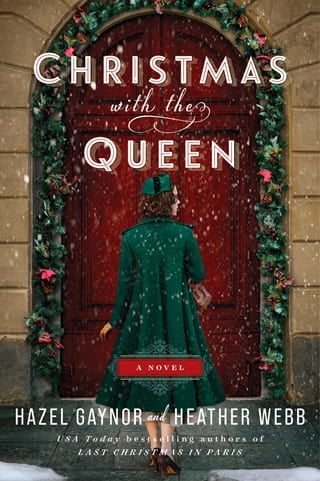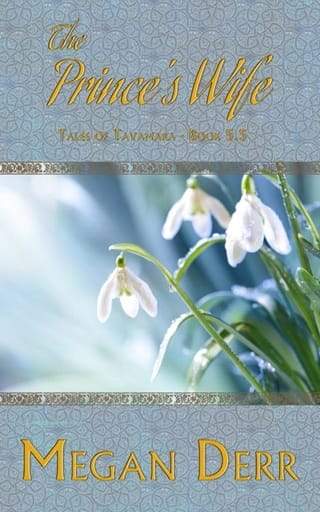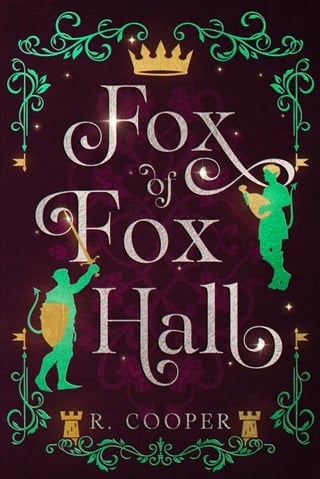Chapter 4 Olive
Chapter 4
Olive
T he day I found out I was going to Sandringham to report on the Christmas preparations had ended so horribly with the poor woman’s accident that I saved my happy news to share with my family at teatime the following day.
“Something exciting happened at work,” I said. “Who’d like to guess?”
Lucy stuck her hand in the air. “Can I guess, Mummy? Was it somebody’s birthday party?”
I smiled. Lucy loved nothing more than a birthday party. She’d even given herself a second birthday, like the queen. “No, darling. Even more exciting than that. I’ve been asked to go to the Sandringham Estate, to make a report on the royal preparations for Christmas!”
My mother’s fork froze halfway to her mouth. My father nodded in his proud fatherly way. Lucy asked what the Sandringham Estate was.
“It’s a big house where the royal family sometimes goes for their holidays, and for Christmas.”
She was beside herself with excitement. “Will you meet the queen? Really and truly?”
“I hope so!”
“How on earth has this come about?” my mother asked. “I thought Charlie Bullen always covered the royal family. Has he retired?”
“You almost sound disappointed, Barbara.” My father winked at me.
My mother gave him a withering look.
“Charlie’s not well,” I explained. “Taken ill with the fog. Gone to stay with his sister at the coast, or something.”
My mother looked visibly shocked. “Good God. The poor man. I hope he doesn’t die.”
I stared at her, incredulous that this was her reaction to my news. “Anyway, the point , Mother, is that I’m covering the royal Christmas preparations in his place.”
My father put down his knife and fork. “It’s bloody marvelous, love. Isn’t it marvelous, Babs? I think it’s marvelous.”
My mother, still shaken by news of the possible demise of Charlie Bullen, at least managed a token, “It is. Congratulations, love.”
“Can I come, Mummy?” Lucy looked at me with her chocolate-brown eyes. “Please!”
I tweaked her nose. “I’m afraid not, darling. Anyway, it will all be terribly serious and boring. Lots of curtseying and ‘one must not step on the grass,’ and whatnot.” Lucy laughed at my upper-class accent. “But I’ll tell you all about it when I get back.” I looked at my parents. “I’ll only be gone for the day. Will you be able to collect Lucy from school?”
My father nodded. “Of course, love. Take all the time you need. We’ll be fine, won’t we, LouLou.”
Lucy adored her grandpa. Spending extra time with him almost made up for not seeing the queen.
My mother studied me through narrowed eyes. “When do you go? You need a haircut. And what on earth are you going to wear?”
I was on the train to Norfolk by the end of the following week. The fog had finally lifted after a devastating week during which thousands had lost their lives, and countless more had been left severely ill. It was a relief to see the sky again as life returned to something like normality, although setting off for an appointment with the queen was anything but normal.
After much deliberation, I’d eventually settled on wearing a sensible knitted twin set my mother had suggested. Half a size too small, it pinched my waist and clung apologetically to my bottom, and the buttons strained against my bust, but it was the best thing I owned. My hair had been cut and styled, a loose button had been stitched back onto my best coat, and my shoes were polished until they looked like glass slippers. I’d added my grandmother’s locket necklace at the last minute, for luck. I checked my makeup in the mirror of my compact and added a little pressed powder to cover the high color in my cheeks. I was almost sick with nerves.
My stomach churned at the prospect of what—and who—would be waiting for me at Sandringham. Doubt and worry battled with my sense of excitement and ambition. What had I done? What ridiculous situation had I got myself into now? I’d taken a chance, grabbed an opportunity, and I could no more stop the train as it hurtled through the Norfolk countryside than I could stop the chain of events I’d set in motion the moment I’d stepped into Tom Harding’s office. It wasn’t the first time my life had felt wildly out of my control, and, knowing me, it wouldn’t be the last, so I took a deep breath and held on to see where it would spit me out next.
As unprepared as I was in many ways, in another way I felt as if I’d been preparing to meet the queen for half my life. Apart from her wedding day, when I’d seen her several times but only from a distance, I had seen her up close once before, as we’d danced in a conga line around Trafalgar Square on VE Day. I knew it was her I’d seen that night—Princess Elizabeth—although Rosie didn’t believe me then, and still didn’t now.
From the moment I’d heard young Princess Elizabeth speaking on the wireless for Children’s Hour during the first year of the war, I’d been fascinated by this regal young girl, so composed for her age. My sister and I had spent the better part of a week mimicking Elizabeth’s clipped pronunciation, pretending to be Lilibet and Margaret Rose, until our mother couldn’t stand it anymore and insisted we give it a rest or she would have to evacuate the two of us overseas.
My first scrapbook about the princess had quickly developed into a second, and then a third as her engagement to the handsome Prince Philip of Greece and Denmark was announced. When Elizabeth Windsor had the world at her feet, I’d found myself with a two-year-old at mine, and while I wouldn’t change a thing—I couldn’t imagine my life without Lucy—it certainly hadn’t been easy. At times, it had been nearly impossible. A fake wedding ring on my finger and a deceased “husband” provided a sufficient explanation for the inevitable questions about Lucy’s father. There were, after all, too many women raising their children alone in the aftermath of war. But I knew I was different to them, and the deep sense of shame and the scornful judgment I’d faced in the months during my pregnancy still lingered painfully. As did the memories of Lucy’s real father. I’d always felt I had something to prove—to him and to myself, but mostly, to Lucy. Perhaps this chance appointment at Sandringham would allow me to do just that.
I took the opportunity to prepare even more for my report as the train clattered along the tracks. On paper, my brief was simple. I was to observe in detail— and without getting in the way of (this part Mr. Harding had underlined)—the preparations for Christmas at Sandringham. How many staff were there, and what was everyone’s role? How was the place decorated? Which members of the royal family were there, or expected? What traditions did the family follow? When were gifts exchanged, and by whom? What was everyone eating? Did the corgis get a gift? (This last question, I’d added myself.) I was to write up my findings into an entertaining and informative three-minute report, which would be recorded for broadcast by Charlie Bullen as part of a Royal Christmas Special. This was my chance, and I was determined to make it count.
Eventually, the train deposited me at King’s Lynn station, where I was met by a driver who went by the name of Evans and who was to take me on to Sandringham.
“I’ve never had a driver before,” I said, nervous energy making me talk too much as usual.
“Mr. Bullen always has a driver, miss. We presumed the same would apply to his replacement.”
“Temporary replacement,” I emphasized. “I mustn’t get used to this sort of life! Do I sit in the front or the back?”
At this, Evans smiled. “The back, miss.” He held the car door open for me. “All aboard!”
Once we’d left the town behind, it was a pleasant drive along narrow country lanes, through pretty villages and past stone cottages. As we got closer to Sandringham, I noticed that many of the homes had their doors painted the same shade of blue.
“What does the blue door mean?” I asked.
“Those are estate houses, miss. Any building with a light blue door is owned by the king. I mean, queen! The shade of blue is a nod to the queen mother’s racing colors. Many are lived in by estate staff. I have one myself.”
Everything was immaculate, the front gardens tidy, not a dustbin or pigeon to be seen. I felt a million miles from London.
“It’s all so pretty,” I said.
“Wait until you see the main event! Here we are, miss. Enjoy the view.”
I peered out of the window like a child staring into a sweet shop as he turned the car through black wrought-iron gates with gilded royal crests. Uniformed policemen stood as stiff as toy soldiers on either side of the posts. I showed the papers I’d been given and held my breath as they were inspected and my name checked against a list. I breathed a sigh of relief when we were waved along.
Evans continued up a vast sweeping driveway, passing immaculately manicured lawns and frost-dusted trees and borders. There was a different feeling in the air here, a wonderful sense of space and serenity. No wonder the royal family loved it so much. No wonder they traded their palaces and castles for this peaceful sprawling home in the countryside. And what a home it was!
I gasped when I saw a beautiful building emerge through the trees.
“Not been here before, miss?” Evans asked.
“Never. It’s bloody enormous!” I clapped my hand over my mouth. “Oops. Sorry. I mean, very enormous.”
He laughed lightly. “And yet it’s one of the smallest royal homes. You’ll be surprised when you see inside.”
I could hardly wait to see inside. I could hardly believe I was here at all.
“You’ll be in good hands with Mrs. Leonard,” he continued. “She probably knows more about the house than anyone else, the queen included!”
“Who is Mrs. Leonard?”
“The housekeeper. She’ll give you the tour.”
“The tour?”
“She’ll show you the bits of the house you’re allowed to access. Give you a few quotes for the report. The usual stuff.”
My shoulders slumped. I didn’t want a tour, or the usual stuff, or pre-prepared quotes. I wanted to see what it was really like to be part of a royal Christmas. I wanted to put it into my own words.
Evans pulled the car to a stop and opened the door for me.
As I stepped out, I took a deep breath, filling my lungs with the crisp clear Norfolk air. For the first time in weeks, I felt as if I could breathe properly. It felt wonderful, magical, and it was exhilarating to be somewhere new, where nobody knew anything about me, and the mistakes of my past were a secret I could keep hidden away.
I looked at the wedding ring on my finger and wished I could take it off, wished I could be free of the need to make up a husband in order to save my reputation. I held my head high and straightened my shoulders. Mrs. or Miss, wife or widow—those were just titles. All that mattered was the truth. I was Olive Carter. BBC reporter. I had nothing to hide, nothing to be ashamed of, and everything to prove.
 Fullepub
Fullepub 



